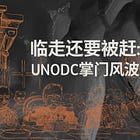Ousting on the Way Out: Why Washington Wants UNODC’s Chief Gone Weeks Before Her Exit
“Leadership changes at UNODC are never just bureaucratic; they are battlegrounds over whose vision of drug control prevails.”
This article is also in Chinese:
As the United Nations marked its 80th anniversary at last week’s General Assembly, questions of credibility and financial sustainability loomed large. Against this backdrop, the U.S. call for the early removal of UNODC chief Ghada Waly is particularly telling. On the surface, it looks like a last-minute personnel dispute. In reality, it illustrates how politics, funding, and management intersect in shaping the UN’s future at eighty.
I witnessed such tensions up close during my five short years at UNODC working on a Justice and Rule of Law campaign. The mandate was clear on paper: promote justice, strengthen institutions, protect human rights. But in practice, political considerations dictated what could be said and what had to remain silent.
One moment remains vivid. In 2020, during the global outcry over George Floyd’s murder, I drafted messaging to address police brutality and promote the office’s own guidelines on policing: Handbook on police accountability, oversight and integrity. However, the leadership hesitated, softened, and ultimately abandoned the message altogether. For a campaign centred on justice and the rule of law, the silence was deafening. Yet it was not unusual: across the UN system, silence on politically sensitive issues often prevails, outweighing even the clearest evidence — from individual incidents of abuse to cases of genocide. That was when I understood how relentlessly politics define the boundaries of principle in international institutions.
Fast forward to today. The U.S. has formally asked Secretary-General António Guterres to remove Ghada Waly, UNODC’s Executive Director, just weeks before her planned departure in November. Washington also “strongly recommended” that Chhaya Kapilashrami, Director of the Division for Management, be appointed acting head.
Why now? Why force out someone already stepping down?
According to Devex reporting, U.S. officials pointed to her extended remote working arrangements. But many observers see this as part of a broader effort to secure influence over the agency’s direction at a moment when global drug policy is shifting toward securitization. Washington has recently authorized armed interventions against Venezuelan drug vessels and promoted enforcement-heavy responses to narcotics trafficking. Ensuring that UNODC’s leadership is aligned with this posture seems far from accidental.
While parts of the U.N. system (WHO, UNAIDS, OHCHR) emphasize health- and rights-based drug policy, UNODC’s portfolio remains heavily weighted toward law enforcement and criminal justice.
If the balance shifts further toward an enforcement-first agenda, the space for health, harm reduction, and rights risks being squeezed out. The consequences are not abstract. They can mean disillusionment among staff, the erosion of the office’s autonomy, and growing skepticism from countries in the Global South, many of which already question Washington’s motives.
This episode also reflects the wider fragility of the UN as it marks its 80th year. The chronic funding crisis leaves agencies like UNODC especially exposed. Management shortcomings have compounded frustrations within the office. And across the system, the UN’s ability to stand on principle is under sharp scrutiny. From Gaza to climate action, the perception is that power, not principle, sets the agenda. The U.S. intervention in Vienna reinforces this perception at precisely the moment the UN hoped to showcase resilience.
Of course, there are those who defend Washington’s move. They argue that UNODC has lacked cohesion, that drug trafficking has grown more violent, and that major donors deserve a stronger voice. These points are not without weight. But history shows that enforcement-heavy strategies fail to reduce drug harms. What they do instead is entrench cycles of violence, fill prisons, trample on rights, consume public resources and erode public trust. And when expedience dictates leadership, human rights are often the first casualties.
The question today is not simply who will replace Ghada Waly. It is whose vision will define UNODC. Will it become a securitized agency doubling down on punitive strategies? Or will it reclaim space for evidence, dignity, and human rights in global drug policy?
As the UN moves from UNGA80 commemorations into the remainder of its 80th anniversary year, the stakes could not be clearer. This is not just about one agency. It becomes once again a test of whether the United Nations can resist capture and act on principle — or whether, once again, politics will silence the very values it claims to defend.




